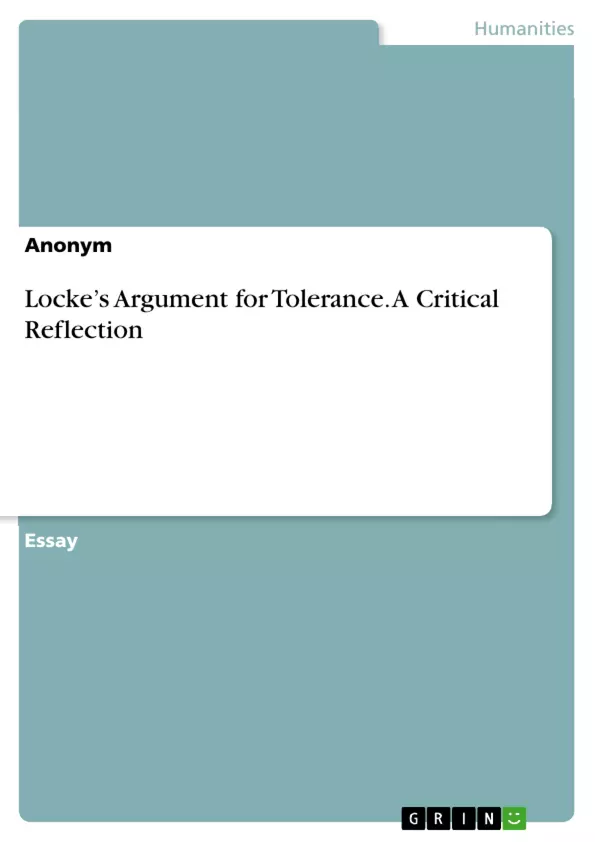The critical argument in "A Letter Concerning Toleration" is the doctrine of defending the rights of the individual from the state and the church. Locke explains that the function of a state is to defend the rights that a person has over another but not establishing and defending a state religion. The exploitation of the outward force of coercion is legitimate as long as the action enforces the rights of individuals away from interference. People have a choice to belong to any religion and uphold contradictory beliefs as long as such actions do not infringe on the rights of other persons. Locke defends human conscience from control by the state and church by arguing that matters surrounding human belief cannot be physically coerced since they demand autonomous reasoning.
Inhaltsverzeichnis (Table of Contents)
- Introduction
- Locke's Argument
- Criticism of Locke's Argument
- Assessment of Locke's Argument in Light of Curley's Objections.
- Conclusion
Zielsetzung und Themenschwerpunkte (Objectives and Key Themes)
This text examines John Locke's argument for religious tolerance as presented in his "A Letter Concerning Toleration." It analyzes Locke's main premises, explores criticisms of his argument, and assesses its validity in light of objections raised by Curley.
- The role of the state in religious matters
- The nature of human understanding and belief
- The limits of coercion in religious matters
- The importance of individual conscience and freedom
- The relationship between church and state
Zusammenfassung der Kapitel (Chapter Summaries)
The Introduction presents the central argument of "A Letter Concerning Toleration," which is the defense of individual rights against state and church interference in matters of religion. The text emphasizes Locke's view that the state's function is to protect individual rights, not to establish or enforce a state religion.
Locke's Argument elaborates on Locke's three main premises: 1) the state has no authority to dictate religious beliefs, 2) human understanding is not subject to forced beliefs, and 3) the state cannot determine the purity of religious belief. These premises lead Locke to conclude that tolerance in religious matters is essential because individuals make autonomous choices in such matters.
Schlüsselwörter (Keywords)
This text explores key concepts such as religious tolerance, individual rights, state authority, church influence, human conscience, freedom of belief, and the limits of coercion. It also examines Locke's argument in the context of criticisms raised by Curley.
Frequently Asked Questions
What is the central argument of John Locke's "A Letter Concerning Toleration"?
Locke argues for the defense of individual rights against interference from both the state and the church, specifically regarding religious beliefs and practices.
What are the three main premises of Locke's argument for tolerance?
Locke's premises are: 1) the state lacks authority to dictate religious beliefs, 2) human understanding cannot be forced to believe something against its reason, and 3) the state cannot judge the purity or truth of a religious belief.
How does Locke define the function of the state in relation to religion?
According to Locke, the state's role is to protect civil interests and individual rights, not to establish, defend, or enforce a state-mandated religion.
Why does Locke believe coercion is ineffective in religious matters?
He argues that true belief requires autonomous reasoning and inner conviction, which cannot be produced through physical force or outward coercion.
What are the limits of religious freedom according to Locke?
Individuals have the choice to belong to any religion as long as their actions and beliefs do not infringe upon the rights or safety of other persons.
- Citar trabajo
- Anonym (Autor), Locke’s Argument for Tolerance. A Critical Reflection, Múnich, GRIN Verlag, https://www.grin.com/document/535625



